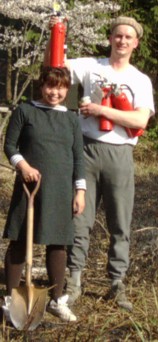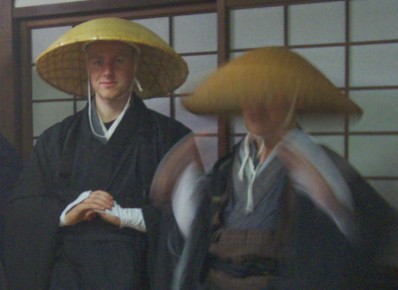| ||||
|---|---|---|---|---|
| Adult practice (Part I) |
One year has passed since I became the Docho (abbot) of Antaiji. Until then I had not much to worry about except my own practice, but now my responsibilities changed: Rather than being a training monk under the guidance of a teacher, I now have to offer guidance to the practioners and visitors who participate in our life, apart from thinking about my own practice. This year, I met with about 150 people who came to Antaiji to practice, had to confront their doubts and answer their questions. I guess that I learned more from them then they from me. This year is also the twentieth year of my own zazen practice. I myself encountered many questions during these two decades, and doubts and difficulties would sometimes pile up like walls in front of me. I can not recount how often I got stuck in my practice, but starting from this month I would like to reflect on my own experience and sufferings, trying to make clear to myself and others what practicing the buddha way means in the first place. When I say this, it might seem as if I was talking about something terribly difficult. That, of course, is not the case. Actually there is nothing as easy as zazen or practicing the buddha way: "What is zazen, what is practice?" "Just sitting, just doing." "What for?" "For nothing. Just do it. Practice the dharma for the sake of the dharma. There is no goal to reach, nothing to long for and nothing to attain. Just follow life in this one single instant, right here, right now - the life that you are presently living. Be one with reality, that is all." The theory is really simple. The only problem is that theory alone will not help us to be content with our practice. Although practice of the buddha way is supposed to be the easiest thing in the world, I think it is a fact that we are never quite content with our practice. Why? Also, even though we know that we should not long for anything, not try to reach a goal or make an attainment - do we not all start out with our practice exactly because we DO want to reach a goal, make attainments and so forth? If we had nothing to long for, we would never have started to practice in the first place. Or who would cross an ocean and climb a mountain to reach Antaiji to "just sit"? People come because they have a goal, and they hope that their practice will make them reach that goal, so they give their best in their efforts to achieve what they think is the buddha way. This is only natural, but it is mistaken from the start. Therefore, it is also natural that people get stuck in their ptactice and can not reach their goals even after years of whole-hearted practice. Getting stuck is not the problem - either way, you will get stuck somehow sooner or later. The problem is what you do when you get stuck. This is what I call the problem of "adult practice". We will not get any further with our childish attitudes. One of my senior dharma brothers says that to try to "just sit" without any method or technique was like "a kindergarten kid trying to study at university." This reminded me of a quote by Yamada Mumon Roshi. The following are not his exact words, I quote from memory: "There are many kinds of religion. Some new cults are like a kindergarten of religion, while those religions that tell us that there will be a good reward for a good deed and a punishment for a bad one are elementary school. Mahayana buddhism is the university of religion, and zen should be called the graduate school." My late teacher, Miyaura Shinyu Roshi, went even further to say: "Antaiji is no school. This is an adult sangha!" For children, kindergarten and elementary school are necessary. They have nothing to learn at a university. You have to be mature, an adult, to climb walls of doubts and difficulties that you will encounter in your practice. What is the exact difference between childish practice and adult practice? Simply put, the question is if you are able to wipe your own ass are not. Kids want to be carried around by "big people". An adult has to walk on his own feet, face the difficulties of his own life, solve his own doubts. More about this next month.
(Docho)
|
|---|
 |
| Takuhatsu |
A group of us from Antaiji recently did takuhatsu, or monk's begging, for 2 weeks at various places in the Kansai area, mainly Kyoto and Osaka. I was surprised by how readily the Japanese people donate to monks, or people training to be monks. Why are they so generous? I didn't feel worthy to receive; I am just another person, full of inconsistencies and delusions, wearing straw sandals, robes and a bamboo hat.
Sometimes people give to many causes out of a kind of guilt, to ease their conscience. But I think the majority of Japanese genuinely respect the Buddhist way, even though very few actually practise it, or know exactly what it is. For most Japanese, temples are just another sight-seeing place, and Buddhism is just a flavouring for the Obon festival (when ancestors are remembered). So, as I was begging, I really wanted to talk about Buddhism to each and every person who passed by. However, this is too impractical and not possible in big cities. So how can I repay my gratitude to the people who donated money to Antaiji? Buddhism is based on the self. So I think the best way is to practise Zen as best I can here at Antaiji, which means refining the self through contributing to the community here and helping others. That's already a big enough challenge. In fact, refining the self is an endless challenge which continues until the day we die. One great thing about Antaiji is that it is free to anyone interested, regardless of age, gender or nationality. This is in stark contrast to other Zen temples in Japan, many of which charge people large sums to stay and practise Zen. So the donated money really helps support our community, and anyone who wishes to be a part.
(Joel)
|
|---|
 |
| Mixed feelings about my zazen practice |
Six years have passed since I left Antaiji. I continued to practice zazen, although I have not been able to establish a practice all by myself. I am now living in America, but as there are no zen centers around, I am visiting Theravada retreats. Many people attend these retreats, but it seems to be quite common for people to stand up in the midst of meditation, walk around freely and disturb those around them. After a while, you get used to this and stop being so disturbed, but then you realize that your own practice is slacking down and you start to wonder why no-body seems to be able to meditate properly. During zazen, of course, you should not think about people, but I discovered how big an influence your environment can have on you. In Antaiji, the environment is all quietude. In this silence, on the other hand, your own attitude is questioned: How am I able to function with no-mind in all activities of the day, centering my work around zazen? To make no division between zazen and daily life is - I think - the main point of zen.
(Eiryu)
|
|---|
